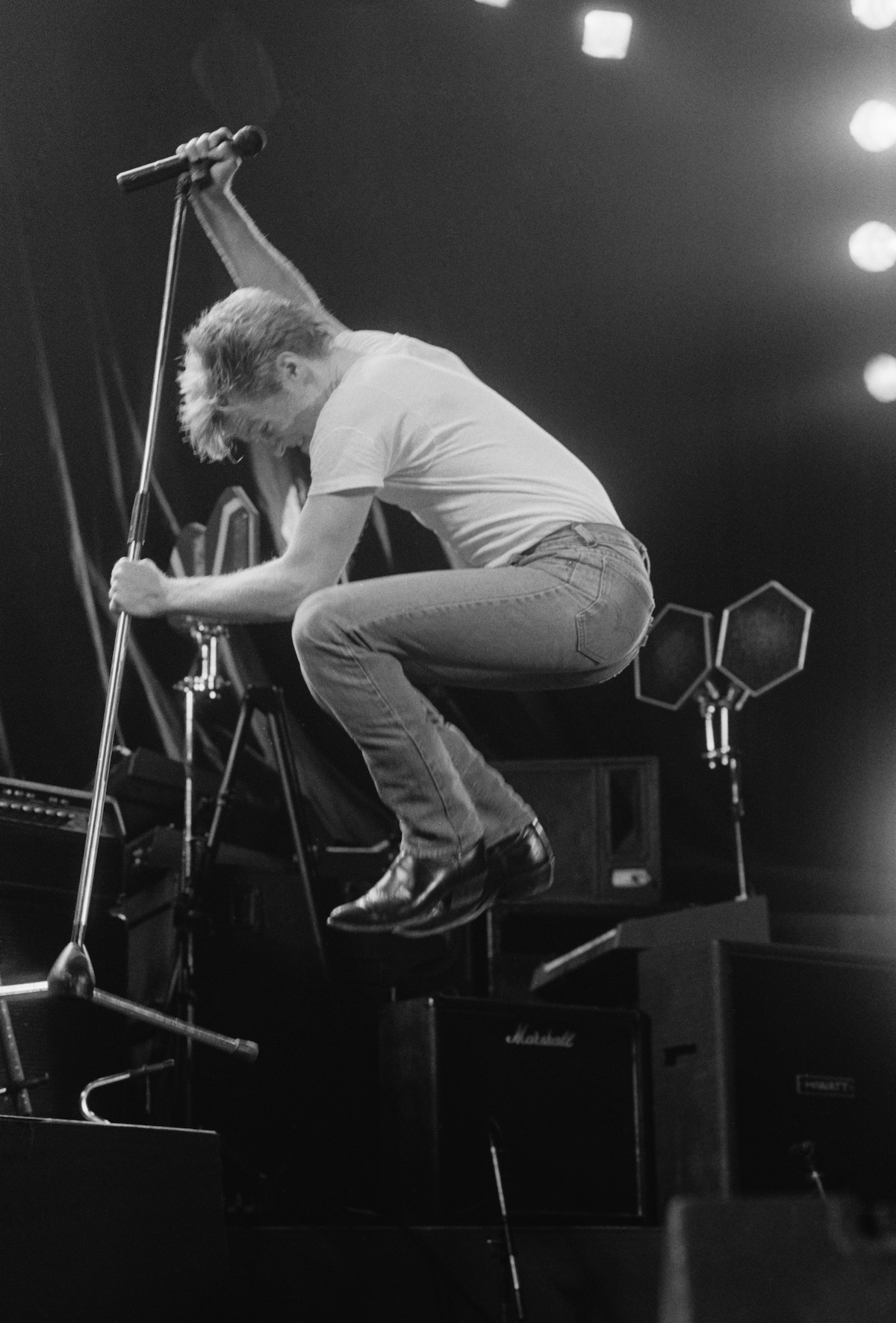As I greet Bryan Adams on our phone call, he’s surprised that SPIN is doing a feature on him.
“I didn’t know that SPIN was a big fan,” he says, as he heads to Italy to continue his world tour supporting his new album, Roll With the Punches. I’m confused and ask him to elaborate.
“Never had a decent article or anything from SPIN,” he says. “Not that I really follow all that stuff that much, but I’ve been around such a long time, you kinda get to know who the players are. They’ve never given me any space, so I’m just surprised that I’m actually getting to talk to you guys.”
I’m surprised, too. I assumed he’d never agree to talk to me after my piece, “My Name is Charles and I’m a Diehard Bryan Adams Fan,” in which I wrote about my admission of being a lifelong fan.

Turns out, Adams didn’t know about it, which is not surprising, despite my delusions that he’d actually read it. I mean, it’s Bryan fucking Adams. The guy is still selling out arenas, and over the course of his more than 40-year career, has sold more than 100 million records and singles worldwide. He doesn’t have time nor the capacity to care about every little article written about him.
“Oh dear,” he says jokingly, as I blather away nervously, telling him about my article and swearing to him that it wasn’t a hit piece. “Oh dear…” he jokes again.
But Adams does care. Not only does he ask me to send him my article, but he’s polite and gracious with his answers to my questions. And he’s patient with me as I work to fend off my unusually nervous energy because…it’s Bryan fucking Adams.
And then, he says something that makes me realize that, for Adams, his career has never been about publicity or the cool factor or ego.
“I’ve done what lots of musicians have done over the years. I’m not that special,” he says. “You know, I’m just another one of the guys that went out and wrote some songs and went on tour, and I’m still doing it because I kept it simple. Good tunes, man. It’s all about the music.”
It’s his humility, his incredible modesty, that’s helped him stay grounded during the course of his career, despite having one of the most successful singles of all time with “Everything I Do (I Do It for You),” his triple-platinum theme to 1991’s Robin Hood: Prince of Thieves, a song that reached No. 1 on music charts in 19 countries, spending 17 weeks on Billboard Hot 100’s sales-only chart.
While Adams is a certifiable rock star, he’s not a rock star in the classic sense; the kind who’s fashion-forward, who epitomizes cool by wearing sunglasses indoors, or seeks the limelight by any means necessary, especially if it involves some sort of debauchery. Even now, he possesses an “aw shucks,” attitude. He genuinely seems like the kind of guy you could have a beer and an easy conversation with.
While he attributes his longevity to the quality of his songs, he also credits something else: loyalty.
Adams and guitarist Keith Scott have known each other since they were 16 years old, playing in the same club circuit in Canada.
“I can remember it very vividly,” he says. “I knew about Keith before I actually met him because he was very renowned within the club circles where we were all playing.”

The two were both playing gigs in Toronto on the same night, says Adams. Different bands, different clubs. The afternoon before their prospective shows, they bumped into each other while Adams was on a walk. He invited Scott for coffee, and the two got along famously. Fast forward a few years, and Adams had just recorded his second album, 1981’s You Want It You Got It. He was putting together a tour band to support the album. “I thought, ‘I wonder what Keith’s doing,’” he says. “So, I got in touch with him…been together ever since.
There’s a sense of pride in Adams’ voice as we talk about Scott.
“He’s my beautiful brother, you know? He’s one of the most unrecognized great rock guitar players ever,” he says. “He doesn’t get the recognition he deserves.”
Another person Adams remains loyal to is Jim Vallance, Bryan’s longtime songwriting partner. Vallance and Adams met in 1978 when 18-year-old Adams—fresh from leaving local band, Sweeney Todd to pursue a solo career—was introduced to him at a music store called Long & McQuade in Vancouver. Vallance had left his band Prism and was working as a session musician. The two formed a songwriting partnership to help bolster Adams’ career, but also as a way to make some money through licensing songs to other artists, including two songs for KISS: “Rock and Roll Hell” and “War Machine.”
While Adams’ first two albums were moderate successes, it was his third record in 1983, Cuts Like A Knife, that rocketed him to stardom, spinning off three singles, “This Time,” “Straight From the Heart,” and the album’s title track. The record was certified platinum in the U.S. and triple platinum in Canada. “Cuts Like a Knife” earned Adams and Vallance a Juno Award for Composer of the Year.
Many of Adams’ songs helped define the 1980s. Reckless, his fourth album, released in 1984, is by far Adams’ most successful, selling more than 12 million copies worldwide and spawning four hit singles—“Run To You,” “Somebody,” “Heaven,” and his ode to nostalgia and youthful sexual exploration, “Summer of ’69. The latter track gained renewed attention when Taylor Swift covered it during her 2018 Reputation tour in Toronto, inviting Adams onstage to perform it with her. She told her audience of more than 100,000 tweens, teens, and adults in attendance, “It’s just one of my favorite songs ever written.”
“First of all, she did an incredible job, that’s the main thing about it,” says Adams, after I mention how cool it was that Swift felt a responsibility to acknowledge his place in music history. “She loves the song, so you can see that she digs it. I sang the harmony, and one of the magic things about that song is the two-part harmony. It’s very subtle in that recording and it’s subtle on my recording as well. But I really enjoyed not singing the lead vocal. I knew she was going to kill it.”
Another tour Adams recalls fondly is Tina Turner’s 1985 Private Dancer Tour, where he was the opener.
“Back in those early days, I was taking every gig and any gig I could get. But then when that tour happened, it really shifted things,” he says.
While Adams was big in North America, he still wasn’t able to break through in Europe, partly, he says, because he felt like his record label at the time, A&M, wasn’t doing enough to promote his work internationally. Turner’s tour, it just so happens, was in Europe.
“It’s funny, songs like ‘Summer of ’69’ were big in America and Canada, but they just didn’t happen anywhere else in the world,” he says. “But as a result of the tours, you can’t go to a pub anywhere and not hear that song. Tina helped turn things around for me and made people sit up and go, oh, maybe we should promote this album. But also, she was just such a fun person to be out with. She just was so welcoming. I really loved Tina. I was a big, big fan before I even got to record with her. So, to get to work with her every night…we became friends. I sang at her wedding. She was a really special part of my life.”
Adams has spent most of his career under the control of major labels such as A&M, Polydor, and Verve, all part of Universal Music Group. At 65, Adams is now an indie artist with his own label, Bad Records.
He initially started it as a joke.
“I was doing this covers album, which I didn’t really want to do,” says Adams. But I got talked into it by the record label, and I thought, ‘I’m going to have some fun with it anyway, what the hell.’”
After his record contract expired a couple of years ago, Adams began thinking more about going indie.
“I thought to myself, ‘Maybe I should actually do something with my label, like really take it seriously.’ And so I hired this guy to help me, and we’re doing it. And so in August, my first solo album’s coming out. And it really is my first solo album because it’s completely independent. We’re not on anybody’s label. We’re not affiliated with anybody other than a distributor, and off we go.”
Roll With the Punches might just be Adams’ most personal album yet. But it’s still classic Bryan Adams—simple, straightforward rock and roll.
“It has to do with leaving my management and becoming an independent artist and leaving my label,” he says.
In 2022, Adams re-recorded some of his biggest hits like “Summer of ’69,” “Heaven,” “Please Forgive Me,” and “Run To You,” and released them as the compilation albums Classic and Classic Pt. II as a way to gain back control of his music when Universal Music Group refused to return his original masters, à laTaylor Swift.
“It was just a smart thing to do because those songs were recorded at a different time when I was fully locked down,” he says. “Anything I did, I didn’t own. It was so difficult getting out of the grips of Universal. And when I finally did, it was like, okay, I never want to go through that again. That was just awful.”
To boot, Adams also left his manager of 44 years, Bruce Allen, in 2023.
“I don’t want to be tied to anybody like that again. I just want to be free.”
The album’s title track says it all: “Sometimes you need to fight / Stand up for what you think is right / But there’s some things you never get to choose / like when you ain’t got nothin’, you ain’t got nothin’ else to lose.”
While the album’s theme revolves around Adams’ move toward independence, there are songs that, depending on your interpretation, could be seen as political, such as “A Little More Understanding.” But Adams says it’s more about empathy than anything else.
“That song really is my message for the times,” he says. “I feel that we do live in these sort of precarious days. It’s not a political song, but it’s certainly a song about, perhaps if we all did understand each other a bit better, if we walked in each other’s shoes and looked at both sides, we would see that we actually do have common ground.”
Adams tells me that as far as going “solo,” so far, so good. Last year, when he put out his Live At The Royal Albert Hall box set on his Bad Records label, it sold better than when he released a similar live box set under his previous label, BMG.
I ask him if going out on his own makes him nervous. Adams replies, “Let me tell you something. It’s already better than everything that had been happening with the label I was with beforehand for the last 20 years.”
As we conclude the interview, I ask him if there’s one moment he feels that has defined his career. He tells me there are too many to name, but that it all goes back to the music. “I can’t tell you what I had for dinner last Tuesday, but I can remember every single song I’ve ever written and where I was at that time. How crazy is that?”
Bryan. Fucking. Adams.


Leave a comment